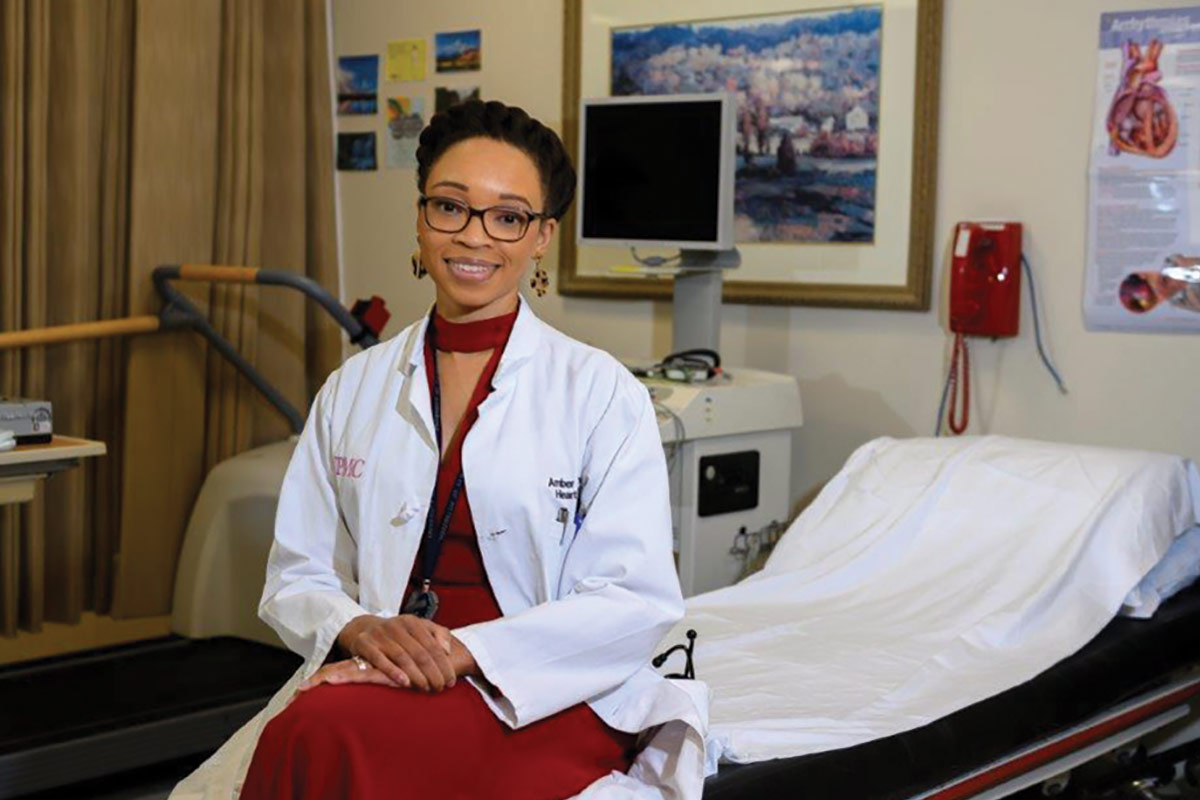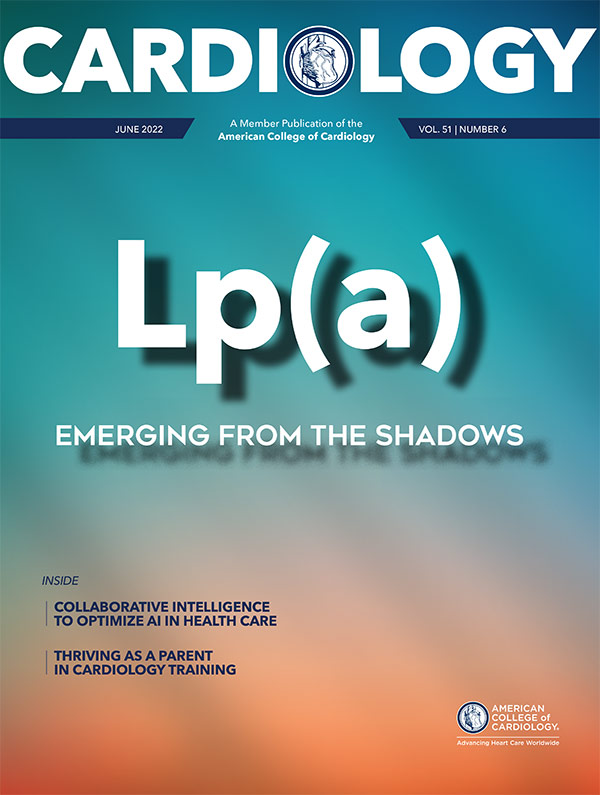Pathways | Amber Johnson, MD, FACC: Saving Hearts and Blazing Trails in Pittsburgh

Amber Johnson, MD, MS, MBA, FACC, did not grow up around doctors. Her mother was a flight attendant and her father in the Air Force. But a love of math and science in high school led her to medicine. Today, Johnson is an assistant professor of medicine in the division of cardiology at the University of Pittsburgh School of Medicine, working in the same city where she grew up. She was also recently recognized by the National Minority Quality Forum as one of the "40 under 40 Leaders in Minority Health."
Johnson's journey to cardiology came from her experience as an emergency medical technician, when nearly every patient she saw had some form of heart disease. Armed with her first stethoscope – which she still uses today – she knew from the start she was going to be a cardiologist. It wasn't an easy road – especially for a Black woman. In eighth grade, for instance, when she told her guidance counselor, a Black man, she wanted to do something in the sciences, he put her into remedial classes. "I realized that although I had aspirations, other people were not necessarily supportive," she says.
Even later, when she knew she wanted to be a doctor, people asked her if she was sure or if she meant she wanted to be a nurse. "People just didn't see that I had the potential to be a doctor," says Johnson. "I think had I not been as determined as I was, I would have been easily pushed into a different direction."
Her determination got her through the MD/MBA program at Jefferson Medical College at Widener University in Philadelphia, despite a lack of mentors. She attributes not having a mentor to not having come from an academic background and knowing how to "navigate academia."
Amber Johnson, MD, MS, MBA, FACC
She also says her race and gender likely played a role, despite being hard to quantify to what extent. "I know the data and the studies," she says. "I know that implicit bias exists ... and there are those microaggressions you cannot really put a finger on, but you know are there."
After her residency at Johns Hopkins Bayview in Maryland, Johnson completed her cardiology fellowship at Pittsburgh, where she has remained ever since.
Race, Gender and Cardiology
Choosing cardiology thrust Johnson into a male-dominated and racially homogenous profession. In fact, she is the only Black female cardiologist in Pittsburgh. Although Blacks account for 13% of the adult U.S. population they represent just 2.7% of adult cardiology practitioners, while women make up just 12.6%.1
According to Johnson, the racial and gender disparities and resulting lack of role models to follow haven't made things easy. "It makes it hard to envision yourself as being in cardiology," she says. She also notes the challenge in being the "first" and/or the "only."
However, she is using her experience to speak out about race and gender issues in medicine and to encourage more women and minorities to enter the field.
Fostering Diversity in the Workforce
Today, Johnson serves on the University of Pittsburgh's Diversity Advisory Council; is a faculty member at its Center for Race and Social Problems; and works closely with the ACC on diversity issues.
She has also received several high-profile awards, including the Escalator Award from the Women As One organization, which focuses on giving more visibility to women in cardiology; and the "40 Under 40" award.
Johnson also has participated in a program called "I Look Like a Cardiologist," which aims to close racial and gender gaps in medicine by mentoring high school students. "I meet these young women who are inspired by the work I do and yet I'm just being myself," Johnson says. "It's pretty cool."
Practicing Cultural Humility
Her goal is to help move the field foward so that the clinician workforce is more representative of the patient populations they treat. Additionally, Johnson also hopes to help clinicians – regardless of race, ethnicity and gender – to better advocate for all of their patients.
"To really make a difference in health equity, everybody has to be able to provide care that is therapeutic, regardless of their race and gender. It shouldn't be necessary for the Black doctor to see all the Black patients in Pittsburgh," she says.
She also stresses the importance of "cultural humility," defining it as a recognition that "what we do, the dogma that we're taught, is not the only way." Instead, she says, "by understanding the perspectives of others we can learn from it, we can grow together, and we can generate those therapeutic relationships."
Empathy is also important. "Empathizing with someone is the best way to advocate for them and generate the best outcomes," she says, "because it requires that you see yourself in their shoes and you understand the life they're living."
It is not easy, she admits. "It really is paradigm shifting, because it's not usually what we're taught in medical school, residency or fellowship, which is to always have the answer."
But the best doctors, she says, learn from their patients. "I get to know my patients and try to understand their communities by humbling myself and benefiting from the expertise they have to offer."
Reference
- Mehta LS, Fisher K, Rzeszut AK, et al. Current Demographic Status of Cardiologists in the United States. JAMA Cardiology 2019;4:1029-33.
Clinical Topics: Cardiovascular Care Team
Keywords: ACC Publications, Cardiology Magazine, Mentors, African Americans, Cardiologists, Sex Factors, Counselors, Elevators and Escalators, Emergency Medical Technicians, Empathy, Fellowships and Scholarships, Goals, Health Equity, Internship and Residency, Leg, Maryland, Mentoring, Minority Health, Mothers, Philadelphia, Schools, Medical, Social Determinants of Health, Stethoscopes, Touch, Universities, Cardiology, Social Problems, Interpersonal Relations, Heart Diseases, Students, Faculty, Fathers, Awards and Prizes
< Back to Listings


